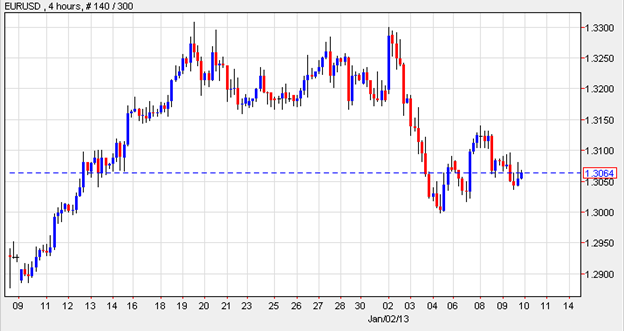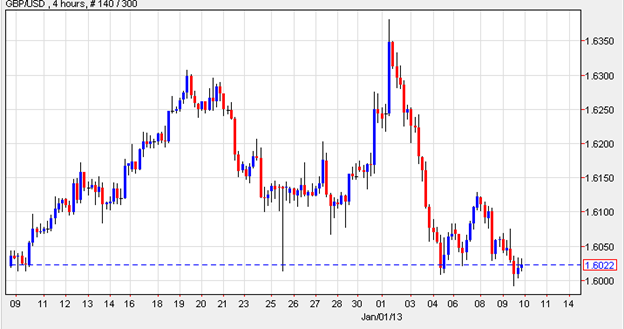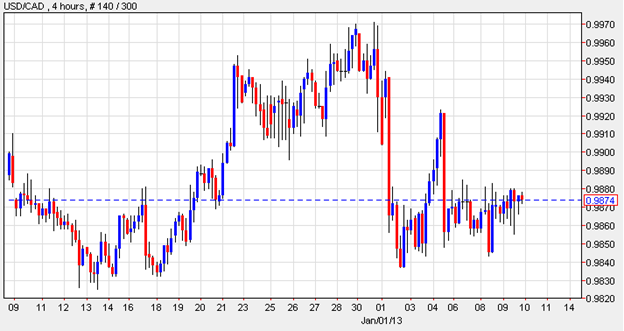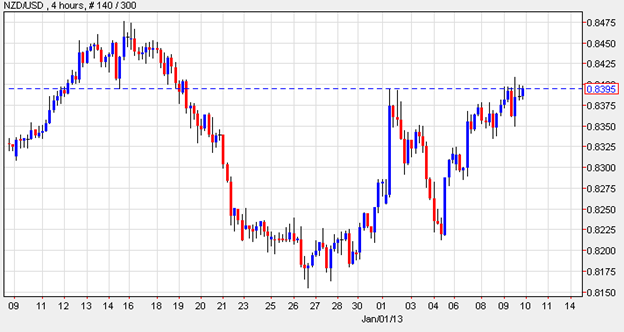The U.S. dollar rallied following bearish comments by the Federal Reserve along with a surge in speculation that European and British central banks may increase monetary easing at some point in the near future. The Federal Reserve’s officer from the Richmond bank warned that the current monetary policy may boost inflation. He suggested putting a stop to the purchasing of mortgage-backed securities and recommended buying long-term Treasurys instead.
On the economic data front, reports indicated that MBA Mortgage Applications climbed by 11.7 percent. Meanwhile, the Canadian Dollar traded close to a three-week high versus the euro on the likelihood the European Central Bank will keep interest rates low. The ECB President, Mario Draghi, is expected to leave the cost of borrowing money at 0.75 percent –a rate that has been in place since the summer of 2012. The loonie remained unchanged even as an economic release indicated that the nation’s housing market slowed during the last month of 2012.
The Euro traded mixed before the commencement of the European Central Bank’s policy meeting, during which officials are expected to agree to leave current interest rates unchanged. However, investors believe the ECB may raise the rates some time in the near future, and this weighed on risk appetite. The Euro declined further on speculation President Draghi may comment on such a possibility during a press conference which is set to follow the meeting.
The British pound plunged to the lowest level against the U.S. dollar since November after lackluster Retail Sales figures and disappointing Trade Deficit metrics boosted risk-aversion sentiment. According to economists, the less than stellar data increased chances that the Bank of England may opt for additional monetary easing.
The yen declined for the first time in three days against the U.S. dollar as Prime Minister Shinzo Abe urged the Bank of Japan to raise the inflation target from 1 to 2 percent. The currency fell against the remainder of its counterparts as the bank’s governor, Masaaki Shirakawa, commented that the bank was in close contact with the government.
This served as an indication that the central bank will probably opt for additional stimulus. While Mr. Shirakawa remained somewhat evasive in his answers regarding monetary policy, Chief Cabinet Officer Yosihide Suga stated that the next BOJ board is committed to aggressive policies that will intentionally devaluate the yen.
Lastly, in the South Pacific, the Australian dollar snapped three days of advances after data revealed Retail Sales dropped. However, the country’s bonds rose on speculation the Reserve Bank of Australia will lower benchmark interest rates by March. The New Zealand dollar gained against all of the majors upon the release of data confirming Building Approvals for detached homes climbed the most in two years.
EUR/USD- ECB May Leave Rates Unchanged
The euro traded mixed ahead of the European Central Bank’s meeting, and it weakened against the greenback following the release of reports that showed German Industrial Production rose 0.2 percent in November, which was less than anticipated. YoY, Industrial Production in the region’s biggest economy declined 2.9 percent. Furthermore, Factory Orders dipped 1.8 percent in the same month.
Adding to the risk aversion sentiment, the eurozone announced that the economy contracted 0.1 percent in the third quarter, just as analysts predicted. The shared currency remained under pressure as the markets get ready to receive the data from the fourth quarter earnings and as investors anticipate the ECB may opt for lowering the interest rates. EUR/USD" title="EUR/USD" width="624" height="331">
EUR/USD" title="EUR/USD" width="624" height="331">
GBP/USD- Speculation Increases On BOE Action
The British pound fell below the psychological $1.60 level on speculation the Bank of England will signal the possibility for increasing stimulus as the economy continues struggling to improve. The currency remained under pressure as the Office for National Statistics indicated that the country’s Trade Deficit narrowed from 9.4 bn GBP to 9.2 bn GBP in December. Investors are keeping a close eye on the Bank of England as it’s expected to announce its decision on interest rates and further quantitative easing today. GBP/USD" title="GBP/USD" width="624" height="329">
GBP/USD" title="GBP/USD" width="624" height="329">
USD/CAD- Canada Issues Real Estate News
The U.S. dollar remained little changed against Canada’s currency despite the release of data which showed that Canadian Housing Starts fell less than anticipated, suggesting the country may be able to avert the housing bubble. According to the Canada Mortgage and Housing Corporation, seasonally adjusted yearly rate for Housing Starts went from 201,400 units in November to 198,000 units last month. USD/CAD" title="USD/CAD" width="624" height="331">
USD/CAD" title="USD/CAD" width="624" height="331">
NZD/USD- Kiwi Advances
The New Zealand dollar rose to a three-week high versus the greenback, but its gains were capped as investors remained concerned about the upcoming central bank meetings in the euro region and the U.K. According to official data, Permits for dwellings, not including apartments, increased 4.6 percent in November; this is the biggest hike since May of 2010. NZD/USD" title="NZD/USD" width="624" height="332">
NZD/USD" title="NZD/USD" width="624" height="332">
Today’s Outlook
Today’s economic calendar shows that the Bank of England will issue a decision on Interest Rates and Quantitative Easing. In the euro region, the ECB will announce the Interest Rate Decision and will hold a Press Conference. The U.S. will report on Initial and Continuing Jobless Claims. Japan will publish the Adjusted Current Account. Lastly, China will release CPI and PPI.
- English (UK)
- English (India)
- English (Canada)
- English (Australia)
- English (South Africa)
- English (Philippines)
- English (Nigeria)
- Deutsch
- Español (España)
- Español (México)
- Français
- Italiano
- Nederlands
- Português (Portugal)
- Polski
- Português (Brasil)
- Русский
- Türkçe
- العربية
- Ελληνικά
- Svenska
- Suomi
- עברית
- 日本語
- 한국어
- 简体中文
- 繁體中文
- Bahasa Indonesia
- Bahasa Melayu
- ไทย
- Tiếng Việt
- हिंदी
USD Rallies Following Bearish Fed Comments
Published 01/10/2013, 05:36 AM
Updated 09/16/2019, 09:25 AM
USD Rallies Following Bearish Fed Comments
Latest comments
Loading next article…
Install Our App
Risk Disclosure: Trading in financial instruments and/or cryptocurrencies involves high risks including the risk of losing some, or all, of your investment amount, and may not be suitable for all investors. Prices of cryptocurrencies are extremely volatile and may be affected by external factors such as financial, regulatory or political events. Trading on margin increases the financial risks.
Before deciding to trade in financial instrument or cryptocurrencies you should be fully informed of the risks and costs associated with trading the financial markets, carefully consider your investment objectives, level of experience, and risk appetite, and seek professional advice where needed.
Fusion Media would like to remind you that the data contained in this website is not necessarily real-time nor accurate. The data and prices on the website are not necessarily provided by any market or exchange, but may be provided by market makers, and so prices may not be accurate and may differ from the actual price at any given market, meaning prices are indicative and not appropriate for trading purposes. Fusion Media and any provider of the data contained in this website will not accept liability for any loss or damage as a result of your trading, or your reliance on the information contained within this website.
It is prohibited to use, store, reproduce, display, modify, transmit or distribute the data contained in this website without the explicit prior written permission of Fusion Media and/or the data provider. All intellectual property rights are reserved by the providers and/or the exchange providing the data contained in this website.
Fusion Media may be compensated by the advertisers that appear on the website, based on your interaction with the advertisements or advertisers.
Before deciding to trade in financial instrument or cryptocurrencies you should be fully informed of the risks and costs associated with trading the financial markets, carefully consider your investment objectives, level of experience, and risk appetite, and seek professional advice where needed.
Fusion Media would like to remind you that the data contained in this website is not necessarily real-time nor accurate. The data and prices on the website are not necessarily provided by any market or exchange, but may be provided by market makers, and so prices may not be accurate and may differ from the actual price at any given market, meaning prices are indicative and not appropriate for trading purposes. Fusion Media and any provider of the data contained in this website will not accept liability for any loss or damage as a result of your trading, or your reliance on the information contained within this website.
It is prohibited to use, store, reproduce, display, modify, transmit or distribute the data contained in this website without the explicit prior written permission of Fusion Media and/or the data provider. All intellectual property rights are reserved by the providers and/or the exchange providing the data contained in this website.
Fusion Media may be compensated by the advertisers that appear on the website, based on your interaction with the advertisements or advertisers.
© 2007-2025 - Fusion Media Limited. All Rights Reserved.
